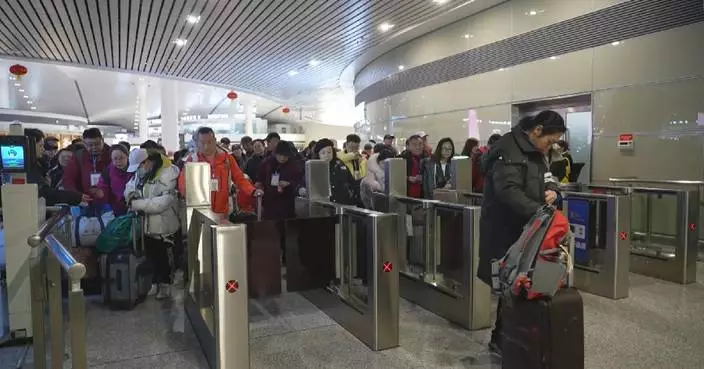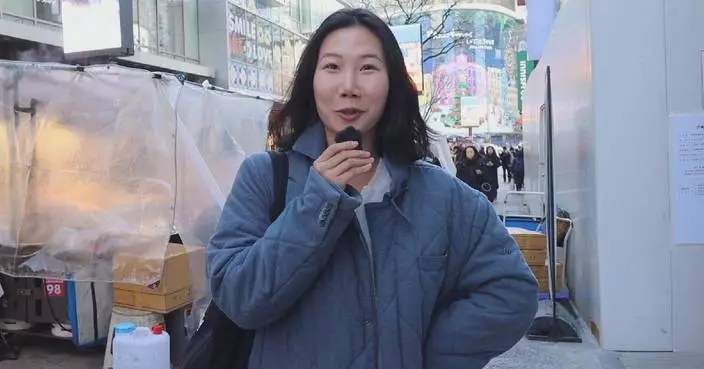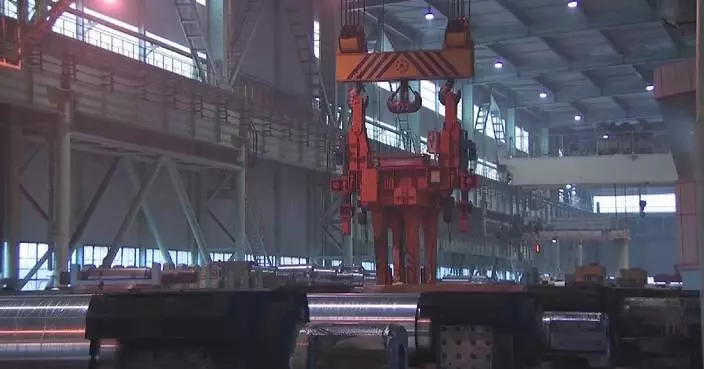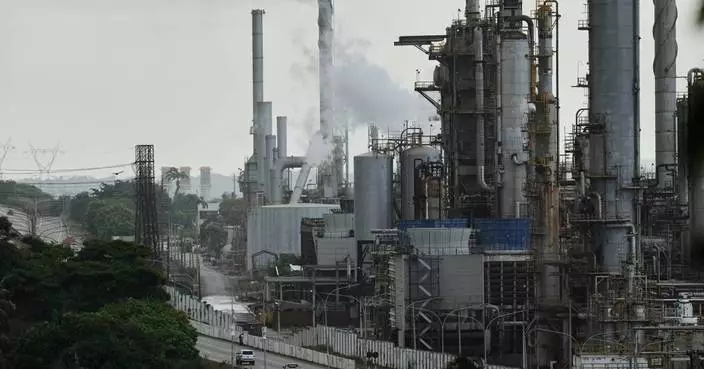Feature · News

China's daily passenger trips up nearly 20 pct during New Year holiday

ROK president reiterates firm adherence to one-China principle

Railways handle record passenger trips in 2025

Photos of Venezuela the day after US forces captured President Nicolás Maduro

US cannot legitimize operation against Venezuela: Chinese scholar

HK financial secretary hails investor confidence amid IPO market boom in 2025

Supercomputing sparks AI innovation

Photos show people reacting to the US capture of Venezuelan President Nicolas Maduro

International Chinese Mathematicians Congress awards talents

Russia launches strikes on Ukrainian targets, Ukraine repels Russian attacks

South Koreans hope president’s first visit to China will enhance exchanges

Decision to switch Africa Cup to 4-year cycle rankles

Berlin power outage affecting 45,000 homes blamed on ‘politically motivated’ attack

How the Monroe Doctrine factors into US arrest of Venezuela's Nicolás Maduro

Malaysian PM, German Vice Chancellor express concern following U.S. attack on Venezuela

Global Youth Multicultural Forum Highlights Xizang Culture in Singapore and Malaysia
Supercomputing sparks AI innovation

Photos show people reacting to the US capture of Venezuelan President Nicolas Maduro
International Chinese Mathematicians Congress awards talents
Russia launches strikes on Ukrainian targets, Ukraine repels Russian attacks
China's daily passenger trips up nearly 20 pct during New Year holiday
ROK president reiterates firm adherence to one-China principle
Railways handle record passenger trips in 2025

Photos of Venezuela the day after US forces captured President Nicolás Maduro
US cannot legitimize operation against Venezuela: Chinese scholar
HK financial secretary hails investor confidence amid IPO market boom in 2025
South Koreans hope president’s first visit to China will enhance exchanges

Decision to switch Africa Cup to 4-year cycle rankles

Berlin power outage affecting 45,000 homes blamed on ‘politically motivated’ attack

How the Monroe Doctrine factors into US arrest of Venezuela's Nicolás Maduro
Malaysian PM, German Vice Chancellor express concern following U.S. attack on Venezuela

Global Youth Multicultural Forum Highlights Xizang Culture in Singapore and Malaysia
Feature·Bloggers

The Most Laughable Lie of the New Year: Jimmy Lai's "Grave Illness" Falls Apart Under Five Hard Facts

【What Say You?】Black Riots “comrades” Thought Ukraine Was Another “Resistance”—Then the Contract Hit

【Bastille Commentary】Green Nails? The Lie No Lawyer Would Touch

【What Say You?】How Jimmy Lai's Right-Hand Man Ran a Corporate Shakedown Operation

【Deep Blue】Trump's "Empire Strikes Back" Gambit: A Long Shot at Best

【What Say You?】Unfinished business With the “anti-Hong Kong triangle”?

Paris court to rule in case involving alleged cyberbullying of Brigitte Macron
- Aptiv Powers Intelligent Edge Applications From Automotive to Robotics at CES 2026
- Guinea's junta leader is confirmed president-elect after first vote since a 2021 coup
- The top photos of the day by AP's photojournalists
- What to expect from CES 2026, the annual show of all things tech?
- US capture of Maduro divides a changed region, thrilling Trump's allies and threatening his foes
- Finland's battle against fake news starts in preschool classrooms
- Trial begins for officer accused of failing to protect children during Uvalde school shooting
- Rubio says US will press change in Venezuela with oil embargo, while Trump insists 'we're in charge'
- South Korean movie star Ahn Sung-ki, dubbed 'The Nation's Actor,' dies at 74

Key business districts see growth in customer traffic, sales during New Year holiday
- Chinese foreign minister holds strategic talks with visiting Pakistani counterpart
- China's bulk commodity price index up for eight consecutive months
- China always opposes imposing one country's will on another: foreign minister
- CMG broadcast vehicles arrive in Italy for 2026 Winter Olympics coverage
- Chinese vice premier calls for closer China-Pakistan community with shared future
- First direct air route between Xiamen, Busan launched
- 2026 "Shopping in China" campaign to focus on consumption on goods, services
- Railway fixed asset investment tops 900 billion yuan in 2025
- China's low-altitude equipment sector grows fast during 2021-2025

Samsung Presents 'Your Companion to AI Living' at The First Look during CES 2026
- Manulife Hong Kong Launches Genesis Centurion Insurance Plan and Prestige Achiever Insurance Plan
- AS Watson Marks 185 Years of Caring: Surpasses 10,000 Smiles for Children With Cleft Lips
- From Zero to Everywhere: VinFast Turned Electric Cars into Daily Life in the Philippines
- Gaw Capital Partners and GFH Partners Form JV to Develop UAE Industrial and Logistics Development Platform
- Samsung Unveils World's First 130-Inch Micro RGB TV Featuring Next-Generation Color and Bold New Design
- Amorepacific Showcases Innovative Technologies at CES 2026
- KT&G's Indonesian Factory Acquires 'ISO 45001' Certification
- Hyundai Motor Group Executive Chair Chung Presents 2026 Vision: Customer-Focused Transformation and AI-Driven Ecosystem Collaboration
- Hong Kong Life Sciences Scholarship Awards: Sowing Today, Cultivating Future Leaders Tomorrow

Driving instructors teach students to dodge danger on Zimbabwe roads
- Why home maintenance deserves a spot in the annual health and budget plans
- Why ordering takeout or calling the dog walker might lead to a happier relationship
- Big Tech's fast-expanding plans for data centers are running into stiff community opposition
- Tesla loses title as world's biggest electric vehicle maker as sales fall for second year in a row
- If someone's always late, is it time blindness, or are they just being rude?
- Flu is rising rapidly, driven by a new variant. Here's what to know
- Meta buys startup Manus in latest move to advance its artificial intelligence efforts
- The year's first meteor shower and supermoon clash in January skies
- What's inside Mexico's Popocatépetl volcano? Scientists obtain first 3D images

What to Stream: Kid Laroi, 'The Pitt' and 'Tron: Ares'
- Leonardo DiCaprio on the importance of creating cinema over content at Palm Springs Film Festival
- Hollywood starts 2026 with 'Avatar: Fire and Ash' No. 1, as James Cameron's sci-fi epic crosses $1B
- In a frozen northeastern Chinese city, an annual ode to ice rises
- What to know about Carnival season, Louisiana's biggest celebration
- BTS announces March comeback date, putting an end to a nearly four-year hiatus
- Country singer Zach Bryan has married Samantha Leonard
- Broadway director Alex Timbers achieves a rare feat with 4 shows running simultaneously
- Rain soaks Rose Parade in California and snow squalls hit Midwest and Northeast on first day of 2026
- Bad Bunny's 'Debí Tirar Más Fotos' could make Grammy history

Luka Doncic scores 36 as Lakers rally past Grizzlies, 120-114
- No. 1 Indiana starts post-Mendoza era by adding former TCU quarterback, new receiver, AP source says
- Gauff clarifies comments on American tennis fans, loses to Bouzas Maneiro
- Rodgers and Steelers win AFC North, beating Ravens 26-24 after Loop misses kick at buzzer
- Top photos from Week 18 of the NFL season
- Czechia beats Canada 6-4 in world junior hockey to set up all-European final with Sweden
- Steelers, Panthers, Jaguars secure division titles. Broncos clinch AFC's No. 1 seed
- Texans win 38-30 over Colts, clinch No. 5 seed in AFC playoffs
- Antetokounmpo scores 37 in Bucks' 115-98 victory over Kings
- Root's 41st century leads England to 364 on Day 2 of 5th Ashes test

Hong Kong Flower Show 2026: Student Drawing Competition Open for Entries Until February 3
- Polish Theatre Premieres Award-Winning Songs of Lear in Hong Kong This February
- Co-owners fined $230,820 for ignoring removal order on unauthorized building structures in Yuen Long
- Hong Kong Launches Dog Vaccination Campaign at Fishing Ports to Combat Rabies
- No New Chikungunya Fever Cases Reported in Hong Kong, Mosquito Control Measures Intensified
- The Fire at Mei Yue House of Shek Kip Mei Estate Caused 1 Death and 8 Injuries
- The Security Bureau Reminds Hong Kong Residents in Venezuela to be Vigilant about Their Safety
- "Wild Twister" in Ocean Park Malfunctioned Again after Four Months, Causing 15 People to be Trapped for 19 Minutes
- Hong Kong Government Launches $3 Billion AI Subsidy Scheme to Boost Innovation and Research
- Flu Activity Declines in Hong Kong; Public Urged to Stay Vigilant and Get Vaccinated

U.S. move against Venezuela sparks condemnation, concerns worldwide
- US strikes on Venezuela draw international condemnation
- Venezuelan acting president urges sovereignty defense against US takeover threat
- Caracas resident voices fear as US strikes spark uncertainty in Venezuela
- Observers say Takaichi's remarks prepare Japan for war
- Iran, LatAm bloc condemn U.S. attack on Venezuela
- Irish businesses expect PM's China visit to expand market access
- Mexican student calls US strike on Venezuela "wake up call" for other countries
- German, Venezuelan experts condemn US military strike on Venezuela
- OPEC to face upheaval in oil sector should Venezuela face change of government
Category · News

Paris court to rule in case involving alleged cyberbullying of Brigitte Macron

Aptiv Powers Intelligent Edge Applications From Automotive to Robotics at CES 2026

Guinea's junta leader is confirmed president-elect after first vote since a 2021 coup

Samsung Presents 'Your Companion to AI Living' at The First Look during CES 2026

Manulife Hong Kong Launches Genesis Centurion Insurance Plan and Prestige Achiever Insurance Plan

The top photos of the day by AP's photojournalists

What to expect from CES 2026, the annual show of all things tech?

AS Watson Marks 185 Years of Caring: Surpasses 10,000 Smiles for Children With Cleft Lips

US capture of Maduro divides a changed region, thrilling Trump's allies and threatening his foes

Luka Doncic scores 36 as Lakers rally past Grizzlies, 120-114

No. 1 Indiana starts post-Mendoza era by adding former TCU quarterback, new receiver, AP source says

Finland's battle against fake news starts in preschool classrooms

Gauff clarifies comments on American tennis fans, loses to Bouzas Maneiro

Rodgers and Steelers win AFC North, beating Ravens 26-24 after Loop misses kick at buzzer

From Zero to Everywhere: VinFast Turned Electric Cars into Daily Life in the Philippines

Top photos from Week 18 of the NFL season

What to Stream: Kid Laroi, 'The Pitt' and 'Tron: Ares'

Trial begins for officer accused of failing to protect children during Uvalde school shooting

Gaw Capital Partners and GFH Partners Form JV to Develop UAE Industrial and Logistics Development Platform

Czechia beats Canada 6-4 in world junior hockey to set up all-European final with Sweden

Steelers, Panthers, Jaguars secure division titles. Broncos clinch AFC's No. 1 seed

Texans win 38-30 over Colts, clinch No. 5 seed in AFC playoffs

Antetokounmpo scores 37 in Bucks' 115-98 victory over Kings

Samsung Unveils World's First 130-Inch Micro RGB TV Featuring Next-Generation Color and Bold New Design

Rubio says US will press change in Venezuela with oil embargo, while Trump insists 'we're in charge'

South Korean movie star Ahn Sung-ki, dubbed 'The Nation's Actor,' dies at 74

Root's 41st century leads England to 364 on Day 2 of 5th Ashes test

That's some pricey fish: A glimpse into Japan's New Year's tuna auction

Driving instructors teach students to dodge danger on Zimbabwe roads

Amorepacific Showcases Innovative Technologies at CES 2026

U.S. move against Venezuela sparks condemnation, concerns worldwide

Graham Ike scores 16 points as No. 7 Gonzaga routs Loyola Marymount 82-47

After Maduro, who's next? Trump spurs speculation about his plans for Greenland, Cuba and Colombia

Devin Booker hits a 3-pointer with 0.7 seconds left to lift Suns over NBA-best Thunder 108-105
Key business districts see growth in customer traffic, sales during New Year holiday

Bluefin tuna sells for record $3.2 million at year-opening auction at Tokyo fish market

Delcy Rodríguez becomes Venezuela's interim president after Maduro's ouster

Owner John Mara gets a game ball after Giants beat the Cowboys 34-17 in season finale

Hong Kong Flower Show 2026: Student Drawing Competition Open for Entries Until February 3

Chinese foreign minister holds strategic talks with visiting Pakistani counterpart

Dave Canales and the Panthers celebrate Falcons' win that gave Carolina the NFC South title

Falcons fire coach Raheem Morris, GM Terry Fontenot hours after finishing 8-9 season

Cuba says 32 Cuban officers were killed in US operation in Venezuela

Stefon Diggs posts his 7th 1,000-yard season after week of legal trouble off the field

Polish Theatre Premieres Award-Winning Songs of Lear in Hong Kong This February

Trump says that Ukraine didn't target Putin residence in a drone strike as Kremlin claims

Myles Garrett breaks NFL single-season sack record with 23 and laments not getting 2 more

China's bulk commodity price index up for eight consecutive months

Bills celebrate home finale with 35-8 rout of the Jets in potential final game at Highmark Stadium

Falcons beat Saints 19-17 to hand division title to Panthers. Atlanta fires coach and GM hours later

Tyler Bertuzzi completes hat trick in OT in Blackhawks' 3-2 victory over Golden Knights

Lions beat playoff-bound Bears 19-16 on Bates' 42-yard field goal as time expires

Co-owners fined $230,820 for ignoring removal order on unauthorized building structures in Yuen Long

Hong Kong Launches Dog Vaccination Campaign at Fishing Ports to Combat Rabies

Hall has goal and assist as Hurricanes beat Devils 3-1 to snap 3-game losing streak

KT&G's Indonesian Factory Acquires 'ISO 45001' Certification

Bills fans brave snow, cold to celebrate final regular-season game at 53-year-old Highmark Stadium

Caleb Williams breaks Bears single-season passing record in loss to Lions

Photos show record-breaking $3.2M bluefin tuna sold at Tokyo's first fish auction of 2026

The Latest: Rubio suggests US won't run Venezuela day-to-day

Stafford throws 4 more touchdown passes, and Rams beat Cardinals 37-20 to secure No. 5 NFC seed

Eagles’ backup plan backfires with 24-17 loss to Commanders that costs them shot at NFC's No. 2 seed

Trump's plan to seize and revitalize Venezuela's oil industry faces major hurdles
China always opposes imposing one country's will on another: foreign minister

Daniel Carlson hits 60-yard field goal to lift Raiders over Chiefs, 14-12

Powell makes career-high nine 3-pointers as Heat beat Pelicans 125-106

Photos show people in Lebanon enjoying winter weather on the slopes

US intervention in Venezuela could test Trump's ability to hold GOP together in an election year

Gabriel Landeskog injured in Avalanche's game against Florida. He'll miss some time, the team says

Rhamondre Stevenson scores 3 TDs and playoff-bound Patriots beat Dolphins 38-10

North Korea says latest missile tests involve hypersonic weapons system

Colts planning to bring back Chris Ballard and Shane Steichen for next season despite collapse

Tkachuk on Panthers' trip: Will he play? His season debut after August surgery may be looming

Maduro’s case will revive a legal debate over immunity for foreign leaders tested in Noriega trial

Hyundai Motor Group Executive Chair Chung Presents 2026 Vision: Customer-Focused Transformation and AI-Driven Ecosystem Collaboration

Hong Kong Life Sciences Scholarship Awards: Sowing Today, Cultivating Future Leaders Tomorrow
CMG broadcast vehicles arrive in Italy for 2026 Winter Olympics coverage

Garrett sets sacks record and Szmyt's field goal on last play gives Browns 20-18 win over Bengals

Streaking Jaguars clinch AFC South title with a 41-7 drubbing of Titans

McCarthy gives Vikings another mixed-bag performance in season finale, including another injury exit

Vikings cruise past resting Packers 16-3 for 5th straight win as McCarthy exits again with injury

Aaron Gordon, Christian Braun return to a Nuggets team needing healthy bodies after Jokic's loss

Infielder Kazuma Okamoto and Blue Jays finalize $60 million, 4-year contract

Michael Porter Jr. scores 27 points against his old team as the Nets beat the Nuggets 127-115









































